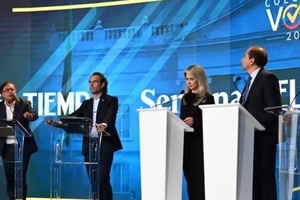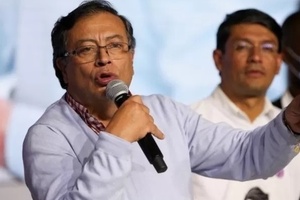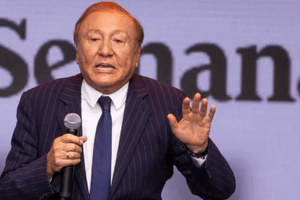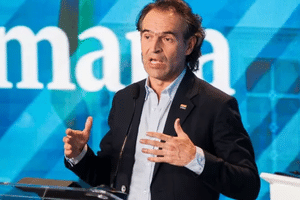This Sunday, Colombians will decide whether to elect the first left-wing candidate in the country’s history or choose the right-wing continuity in the presidency.
Colombian analysts interviewed by BBC News Brazil noted that former guerrilla fighter and senator from the Pacto Histórico coalition, Gustavo Petro, is the only leftist – or centre-left – among the six candidates to replace President Iván Duque in the Casa de Nariño presidential palace. .
Petro, economist and former mayor of Bogotá, is running for president for the third time.
“In the last election, the runoff was between Duque and Petro, and the right came together to prevent the election of Petro and to elect the current president,” said Alejo Vargas Velásquez, professor of political science at the National University of Colombia.

However, he understands that over the past four years, Petro has grown stronger as leader of the opposition and has managed to channel the frustration of sectors of Colombian voters through politics and social exclusion.
“This is a very important election for Colombia. Duque leaves with low popularity and reinforces the need for social change,” said political scientist Luciana Manfredi of ICESI University in Cali.
Boric
Like other countries in the region – in Chile, for example – Colombia recorded strong social protests in 2019 and 2021, leading some analysts to associate the election of Chilean Gabriel Boric, this time with the possible landing of the Petro in the US. The President is Colombian.

Image: Reuters
But he also faces high levels of rejection among Colombian presidential candidates, business people, and the country’s middle and upper classes.
“He urged businessmen to speak, and many of them refused the invitation,” the Colombian analyst said.
Among the proposals of the ‘Petrista’ candidate, as the Colombians call them, is taxing the richest, inspired by conversations with French economist Thomas Piketty, according to the presidential candidate’s allies.
Víctor M. Mijares, a professor of political science at the Universidad de los Andes, noted that Petro created “a lot of sympathy on the left and a lot of dislike on the right.”
five columns
In this Colombian election, besides the pendulum between the left, represented by Petro, and the center-right and the rest of the right, at least five issues are at the center of the debate and the fate of the country’s politics.
These include: Colombia’s relationship with the United States and neighboring Venezuela; fighting poverty; drug trafficking; The violence of guerrilla opponents affiliated with the Revolutionary Armed Forces of Colombia (FARC), an armed group, and the current group, the National Liberation Army (ELN), for over 50 years until the signing of the Peace Agreement in 2016.
military and oil
Other pillars of the current political debate are oil—Petro criticized the oil nation’s dependence on this energy—and uncertainty about the military’s relationship to the left-wing candidate if elected.
“We are not considering a military coup here, but the relationship between the army and the police in a possible left-wing government led by Petro,” said Vargas Velásquez.
United States and drug trafficking
A report in the British Financial Times last week stated that “some of (Petro’s) ideas still reflect the radicalism of his youth”.
The newspaper cites, among others, Colombia’s intention to review its agreement with the United States “on the war on drugs.”
According to Mijares, an analyst at the Universidad de los Andes, the Colombian left opposes the alliance and the way the two countries have fought Colombian drug trafficking for years.
He said that the other candidates are mostly in favor of the continuation of the current system. According to him, the now diplomatically interrupted relationship between Colombia and Venezuela would resume in an eventual Petro government that did not spark unanimous criticism at home, as the two countries have traditional ties involving trade and immigration – presumably more than two. Millions of Venezuelans live on the territory of Colombia.
bulletproof vest
Threatened with death during the campaign, Petro wore a bulletproof vest at rallies and promised a turnaround in the country’s domestic and foreign policy.
African-American vice presidential candidate, social leader and human rights activist Francia Márquez also denounced threats for being a woman and black.
Colombia has a history of political violence, including the assassination of presidential candidates.
“Those who do not fit into our government project are simply corrupt and genocidal. What we are advocating is a solid democracy and social inclusion,” said Petro.
‘Macho’
The election of Petro, or one of the candidates from the centre-right and right, could be due to the traditional high abstention rate and the supposedly embarrassing vote, particularly for presidential candidate Rodolfo Hernández of the Anti-Corruption League of Governors. Kim rose in polls with intent to vote with statements classified as ‘sexist’.

Image: DANIEL GARZON HERAZO/NURPHOTO VIA GETTY IMAGES
“Hernández was expected to make a sound in the campaign. He is the politically incorrect candidate who has provoked embarrassing votes and has risen in recent polls,” said Manfredi of ICESI University in Cali. said.
Hernández’s growth would have lessened the chances of the center’s hope, Centro Esperança’s candidate Sergio Fajardo, including in the academic sectors.
It also came as a surprise to some analysts that Ingrid Betancourt, who was kidnapped by the FARC, withdrew from the candidacy and announced her support for Hernández. She was the only woman to run for president.
40% abstain
Voting is not compulsory in Colombia and, as Manfredi of Latin America’s ‘Red de Politológicas’ observes, there has been around 40% abstention in elections in the last four decades.
The latest polls published showed that Petro was ahead with 35% or even 48% of the vote, and they nearly tied in second place, with around 20%, with engineer and former mayor of Medellín Federico ‘Fico’ Gutiérrez. The engineer, former mayor of Bucaramanga, Rodolfo Hernández, is from the Governors’ Anti-Corruption Association, as surveys by the ‘Equipo Por Colombia’ and the National Counseling Center and the Latin American Geopolitical Strategic Center show.

Image: SEBASTIAN BARROS/NURPHOTO VIA GETTY IMAGES
‘I’m staying’ Gutiérrez has the support of the traditional parties, the Conservative Party and the Liberal Party.
He often repeats, “We are united or we perish,” to show his hatred for Peter.
If the ballot boxes are approved this Sunday (29), the election will be held in the second round, i.e. 19 June, as 50% plus one vote is required for the candidate to be elected.
to worry
Something unites almost all candidates, in addition to the defense, with different nuances, the resumption of diplomatic relations with Venezuela, the concern about the counting of votes.
According to Bogotá’s Semana magazine, Petro, Fico Gutiérrez and Sergio Fajardo agreed that there are “concerns” about the ‘Registraduría Nacional’, which organizes the elections and is linked to the National Electoral Council.
South America
Colombia, a country with a population of just over 50 million and also living in the Andes mountains washed by the Caribbean and Pacific Ocean, faces similar challenges to other countries in the region, including Brazil, such as social inequality and high poverty rates. .
Some analysts say this election is part of regional political chess.
“In the early 2000s, there was a wave of progressive governments with Lula, Tabaré, Evo and others. Today, we have Bolsonaro in Brazil and Lasso in Ecuador (Guillermo) and Boric in Chile and Alberto Fernández in Argentina. Castillo Peru’ Also. Since Brazil will also elect a president this year, we may or may not face a new regional pendulum, depending on what the polls say,” said Colombian professor Vargas Velásquez.
source: Noticias